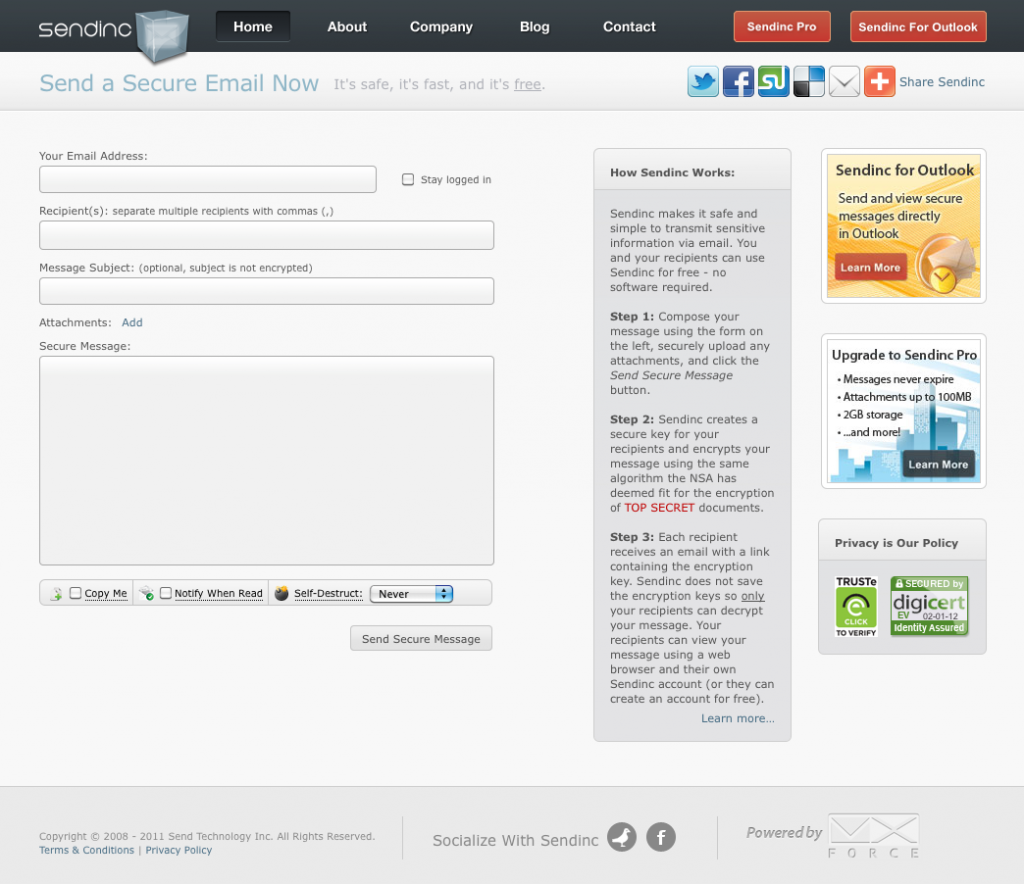 From WikiLeaks information leaks to Anonymous attacks, cybercrime is forcing organizations to rethink how they secure information. Smaller organizations and individuals don’t often have the finances available to secure their information, and something as simple as sending an email can lead to a serious threat.
From WikiLeaks information leaks to Anonymous attacks, cybercrime is forcing organizations to rethink how they secure information. Smaller organizations and individuals don’t often have the finances available to secure their information, and something as simple as sending an email can lead to a serious threat.
Texas-based Sendinc, which launched in March 2011, is a cloud-based e-mail encryption service that reduces the threat of e-mail-based cybercrime. The founders, Dan Stevens and Mike Makowski thought existing technologies where “a complete hassle and overpriced”. So they took their experience in e-mail security and encryption to develop a simple way to send encrypted email. The pair recently brought on Jonathan Boswell, an experience technology start-up executiveto help manage the growth of the company.
Boswell explained that regular emails are not designed to be secure. The contents of an email can be found on both the sender and recipient’s computers, as well as the email host’s servers. The standard email user is willing to sacrifice security since the standard email message doesn’t necessarily have private information, but some professions need privacy.
“Email encryption is incredibly difficult,” Boswell said. “A lot of doctors and CPAs end up using snail mail or fax or break confidentiality by sending unencrypted information.”

He explained that the difficulty with encrypting e-mail is largely due to cost. Large corporations are able to absorb the price to maintain security, but that is not feasible for smaller companies working in industries where privacy is essential, like finance and medicine. Sendinc’s cloud-based approach allows for secure operation at a lower cost for the individual or business.
Sendinc is available for any user with an e-mail address. After signing up, a user is able to send a message to a recipient through a browser-based interface on Sendinc’s site. The recipient of the e-mail is sent a secure link where the message is available. The recipient must sign up for an account to access the message.
There are different models a user can choose from with Sendinc: standard, pro and corporate. The standard model is free. This model is intended for users who occasionally have to send private information, such as a credit card number or medical information, via the web.
“We are happy to exist for free for consumers as a valid service,” Boswell said. “The pro service adds in compliance features, [increases] functionality, and allows more messages to be sent a day.”The Pro version costs $5 per month. Sendinc Corporate allows more functionality for managing the groups using the service, with rates dropping from $5 as volume rates apply.
Sendinc is not the only e-mail encryption service on the market. Enterprises will work with companies to integrate encryption into their existing e-mail programs, but at a large cost. Conversely, there are cheaper options on the market, but they often require the user to have a branded e-mail, in addition to other restrictions, to reduce costs.
“We have created web access and Outlook compatibility, and it is designed to be inexpensive,” Boswell said. “Cloud computing has enabled us to offer substantial cost savings to our clients and our intuitive web 2.0 interface makes sending encrypted email easy to do.
Sendinc has developed a plugin that works with Microsoft Outlook to enable encryption without forcing the user to leave the program. There is also an API that allows businesses to add encryption to an existing e-mail client.
Sendinc has been growing rapidly since its launch, which can be partially attributed to Sendinc’s viral nature; receiving a message that is sent using Sendinc is only possible after the recipient signs up for the service. This organic growth gives Boswell hope for the future of Sendinc.
Boswell explained that Sendinc plans to merge its email encryption and policy engine technologies for large companies.
“There is a huge opportunity for Sendinc to cut costs at the enterprise level,” Boswell said. “If there are 20,000 employees in the company, policy detection and encryption can cost upwards of $500,000. Our integrated system will detect sensitive information such as credit cards or social security numbers and automatically encrypted the outgoing email. We will be able to offer this service for a fraction of the current costs that enterprise pay.”
Learn more about Sendinc online at www.sendinc.com.
Image Credit: Bala









